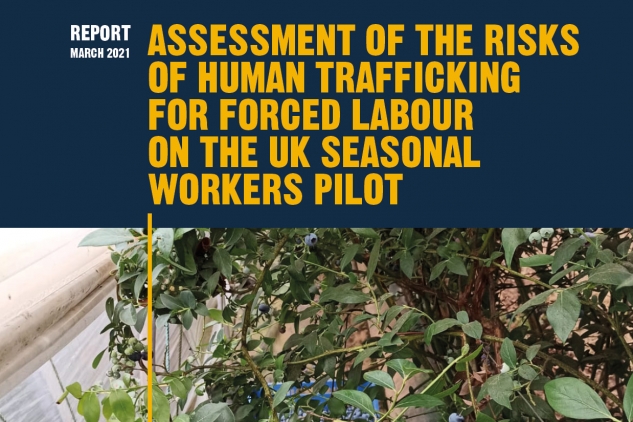
Lucila Granada
Chief Executive
New report highlights risks of human trafficking on UK Seasonal Workers Pilot
Lucila Granada
Chief Executive
Today, FLEX launches Assessment of the Risks of Human Trafficking for Forced Labour on the UK Seasonal Workers Pilot, a FLEX and Fife Migrants Forum report that provides unique independent evidence of worker experiences on the Seasonal Workers Pilot (SWP) in the UK.
The SWP, a Tier 5 temporary immigration route to bring workers from outside the European Union to work on UK farms, was launched by the UK Government in April 2019. The pilot is targeted at the UK horticultural sector and it seeks to respond to concerns about labour shortages during the peak harvest period, particularly following the end of free movement for EU citizens. In its second year, the SWP was expanded from 2,500 to 10,000 workers. In its third and current year, and with the end of free movement, the quota was extended to 30,000 and opened to workers from EU countries.
Temporary migration programmes, such as the SWP, are associated with increased risks of labour abuse and exploitation. The widely recognised risks associated with temporary migration programmes include:
- Debt bondage due to upfront migration costs and illegal recruitment fees
- Deception in recruitment
- Barriers to changing jobs or sectors
- Discrimination
- Temporariness and lack of pathways to permanent residence
- Multiple dependencies
- No recourse to public funds
- Barriers to accessing justice
- Lack of guaranteed working hours
In addition, horticulture is a high-risk labour sector due to factors including: the nature of its product and labour supply chain, isolated workplaces and a large migrant workforce. In response to these concerns, over the past year, FLEX has worked with independent expert on labour exploitation, Caroline Robinson, and the Scottish organisation Fife Migrants Forum to conduct outreach and research into Scottish farms. The research sought to understand the risk of human trafficking for forced labour for people coming to Scotland on the SWP in the horticultural sector.
Based on 146 responses from agricultural workers, including 97 SWP workers from the top four nationalities present on the scheme, this report identifies a serious risk that forced labour could take place on the SWP if action is not taken. The range of risks identified included:
- Risk of unfree recruitment based on a discrepancy between information workers received about the nature of the work and the reality upon arrival, the lack of translation of documentation, and pressure to sign contracts. In addition, 62% of workers reported incurring debts to travel to the UK to work, which places workers in a more vulnerable position and at risk of accepting work they might otherwise not have accepted.
- Risk of work and life under duress, with workers reporting threats of penalties, unsafe housing in caravan accommodation, and excessive dependence on employers due to the use of zero hour contracts coupled with payment by piece rates. 66% of Seasonal Worker Visa (SWV) workers reported receiving threats of loss of work and 17% reported threats of deportation from their employer.
- Risk of impossibility of leaving an employer with 62% of those interviewed reporting being refused transfers to alternative employment. Coupled with the high debts workers reported having to repay as well as risks of homelessness or deportation, this resulted in workers having reduced freedom to terminate their employment contract.
The report outlines recommendations and proposes strategies that can be taken by the UK and Scottish governments to mitigate the risks of human trafficking for forced labour on the SWP and protect current and future workers.
Recommendations to the UK Government include:
- Ensure that employment contracts, enforceable under UK law, are shared with SWV workers in their country of origin, translated into workers’ native languages and signed by employers and workers prior to travel.
- Remove the visa fee (currently £244) to reflect the limited timeframe and wages available on the SWP.
- Establish an independent annual evaluation of the treatment of low wage temporary workers in the UK, including in-depth worker evidence, in order to inform labour market enforcement allocation and direction of resources.
- Ensure SWV workers are guaranteed a minimum income of at least £332.50 per week, for 35 hours work written into their contract of employment.
- Establish a clear employer transfer pathway, including transparent criteria for making a transfer request and a process for considering such requests. This should be communicated to workers at point of recruitment.
- Increase resources to the Gangmasters and Labour Abuse Authority and future Single Enforcement Body to ensure there is capacity to conduct regular proactive inspections of SWP participating workplaces.
- Guarantee SWV workers a complaints mechanism through which workplace grievances may be aired and remedied during their time in the UK.
Recommendations to the Scottish Government include:
- Ensure labour market enforcement authorities establish strong links with workers and worker representatives in order to gather ongoing intelligence about worker treatment at point of recruitment.
- Amend the Caravan Sites and Control of Development Act 1960 so that agricultural caravan dwellings are no longer exempt from local authority licensing.
- Engage COSLA to develop minimum standards for agricultural caravan dwellings that can be used by local authorities to monitor and inspect sites.
- Introduce regulations relating to the calculation of piece rates, including the formula used to reach a fair piece rate and means of communicating this to workers.
- Establish an independent helpline, open 24 hrs, 7 days a week with translation into workers’ languages, for SWV workers through which concerns can be raised about potential labour abuse and labour exploitation.
- Offer financial support to trade unions to organise and provide advice to SWV workers.
Read the full report here.
This project is supported by the Scottish Government and The National Lottery Community Fund.
